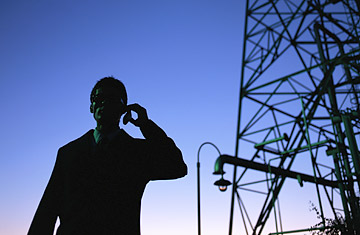
(2 of 2)
Acting Assistant Attorney General Todd Hinnen noted before a House subcommittee March 9: "Some have argued that Section 215 runs afoul of the Fourth Amendment [which governs police searches] because it allows the government to obtain records upon a showing of 'relevance' to an authorized investigation rather than probable cause." But, he added, "for constitutional purposes, a business-records order is not a 'search' within the meaning of the Fourth Amendment."
It's hard to say just what kind of "classified-collection program" the Obama Administration is conducting. There seems to be a consensus among privacy advocates that the government is using the very latest technological advancements to sweep up, among other things, the locations of cell phones.
Your cell phone continuously pings your service providers' towers and base stations in order to maintain a signal for you to use. By recording the precise time and angle of a cell's data arriving at multiple base stations, providers can calculate the location of your phone about as accurately as a GPS unit — which means down to a single room in a building, at least in cities crowded with cell towers.
Some cell carriers track, record and store this information, possibly for months, for all the phones in their networks to monitor usage and plan how to improve service.
Kevin Bankston, an attorney with the Electronic Frontier Foundation, thinks the government is demanding that cell companies provide the location data as well as other call-data records in bulk form in order to mine the data. "My guess is these 215 orders are being used to collect massive amounts of communications data without any direct connection to terrorism targets," Bankston said.
This suspicion is based on the government's relatively well-documented proclivity since 9/11 for vacuuming up huge amounts of data in the service of detecting patterns left by bad apples, as well as the fact that law-enforcement authorities increasingly are seeking cell-phone-location information in criminal cases. There is no reason to think the FBI would not tap the same information to prevent terrorism.
A Justice Department spokesman, Dean Boyd, said these kinds of concerns about civil liberties were overblown. "The Executive Branch, Congress and the judiciary all engage in substantial oversight of these foreign-intelligence-surveillance tools to ensure they are used responsibly and in a manner that safeguards Americans' privacy and civil liberties," Boyd said.
Boyd can't say, of course, if the government is scooping up the location information of cell phones. If that is the case, however, should the government be required to get a warrant? Courts are divided over how private this location data is.
Senator Wyden recently drafted a bill that would have required the government to prove probable cause and obtain a warrant to track cell phones in both terrorism and criminal investigations. In his final bill introduced June 15, however, Wyden dropped the requirement with respect to antiterrorism efforts in a bid to gain Republican support. Wyden says he does "expect to be back to the issue as it deals with intelligence."
Wyden's spokeswoman has said the bill is an "independent legislative action" and the Senator can't say if it is a signal that the government knows the location of your phone.
Correction: The original version of this story misattributed a quote to Senator Mark Udall of Colorado that was actually said by Senator Tom Udall of New Mexico. Senator Mark Udall — a member of the Intelligence Committee — did not speak directly with TIME, though he harbors similar concerns. Mark Udall said on the Senate floor May 26 that the same authority "currently allows records to be collected on law-abiding Americans, without any connection to terrorism or espionage."
